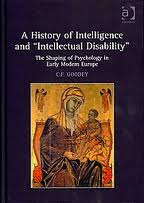A History of Intelligence and “Intellectual
Disability”. The Shaping of Psychology in Early Modern Europe
by C.F. Goodey
UK/USA: Ashgate Publishing Company, 2011
Reviewed by María G. Navarro
A History of
Intelligence and “Intellectual Disability” examines how the concepts of intellectual
ability and disability became part of psychology, medicine and biology. Focusing
on the period between the Protestant Reform and 1700, this book shows that in
many cases it has been accepted without scientific and psychological
foundations that intelligence and disability describe natural or
trans-historical realities.
The author, C.F. Goodey, has been
investigating on the history of intellectual disability for more than 20 years.
He has developed his research and teaching at Ruskin
College , Oxford ,
the Open University and the University
of London
Other important argument is that
intellectual disability is a notion developed through dilemmas around
predestination and free-will in Protestant theology. However, it is important
to not forget that this diagnostic is not equivalent to the author’s claim to
regard intelligence and intellectual disability as historical contingences.
The book is well-structured. Having in mind that the author has accepted certain historical reconstructions focusing his attention on the political, social, psychological and even medical and educative dimensions of the concepts he presents to analyse, we can say that the book is extremely serious in his general plan. Limitations and contradictions of a historical genealogy of intelligence and disability as natural or trans-historical realities will permit the author to test his hypothesis about the radical contingency of our dreams about human intelligence and the particular nightmare of this dream is its absence.
The book is well-structured. Having in mind that the author has accepted certain historical reconstructions focusing his attention on the political, social, psychological and even medical and educative dimensions of the concepts he presents to analyse, we can say that the book is extremely serious in his general plan. Limitations and contradictions of a historical genealogy of intelligence and disability as natural or trans-historical realities will permit the author to test his hypothesis about the radical contingency of our dreams about human intelligence and the particular nightmare of this dream is its absence.
Divided in eight parts A History of Intelligence and “Intellectual
Disability”, has the subtitle The Shaping of Psychology in Early Modern
Europe, the theoretical hypothesis and the historical framework are constituted
by eighteen chapters in which the notion of disability is presented as part of
socio-economic structures, medical histories, status and forms of power and
even as phenomenon that implores a kind of ethics of exceptionality. This
history of intelligence and intellectual disability shows in its passionate
eighteen chapters that the very salient and notable history of human
self-representation is also a history of exclusion and dishonour for testing
the rule of human nature through classification and abnormality.
Goodey presents in this work the
notion of intellectual disability as a product of certain historical
idiosyncrasies as the very important demand from a marketized bureaucracy that
each of us answers to individually. To be more precise, the author affirms that
“the microcosm-macrocosm picture of man’s place in the universe, a central
feature of medieval cosmology, has been transformed in the modern era into a
picture where the horizontal axis of time replaces the vertical one of space,
and a future godlike human intelligence replaces God himself as its point of
aspiration.” (p.39) But the gravity of this assertion is accompanied by
long-term, cross-cultural elements: Goodey presents a complex map since the
ancient Greeks to the history of intelligence and disability in European
socio-economic structures, the important religious texts that present
intelligence (also called ‘wit’) as a self-referential mode of bidding status
and conduct manuals in which it is clear how honour, grace as related to
intelligence occupied a juxtaposes place with the corresponding concept of
disability, etc.
The definitions of these notions are
important because they are part of the history of medicine: following this
theoretical frame doctors have written descriptions of intellectual states and
their relationship to the structure of body and brain. The last chapter
describes the influence of this strong sixteenth and seventeenth discourse on
the philosopher John Locke in his comments on ‘idiots’ and ‘changelings’. As we
know the idiot was for Locke not a changeling as the idiot lacked the
fundamentally human capability to abstract. Goodey also analyses the influence
of Locke’s doctrine on the eighteenth-century theories of behaviour and modern
educational practices: “Locke replaces an organic, behavioural and provisional
model of foolishness with one that is disembodied, intellectual, and permanent”
(p.326).
Researchers and scholars interested
in studying intelligence and of lack-of-intelligence in periods before the 20th
century will find in this book one of the most relevant work.
But as intelligence is a peculiar
idea maybe many researchers will continue asking why our modern understanding
of intellectual disability, a contingent and accidental notion, crystallised
around 400 years ago and what that implies for us in our current century not
only in Western but in the whole world. I am sure it will continue to be contingent
and accidental but in what sense and what kind of humans beings are currently
classified by these notions? Is also animal’s intelligence part of the scenery
about the lack-of-intelligence we should analyse? How Goodey´s thesis about the
contingent and accidental definition of disability, intelligence and
lack-of-intelligence affects our new and future conceptions of human
self-representation and animal representation? Reading this book will give you
some answers but it will also increase the number of questions.

No comments:
Post a Comment